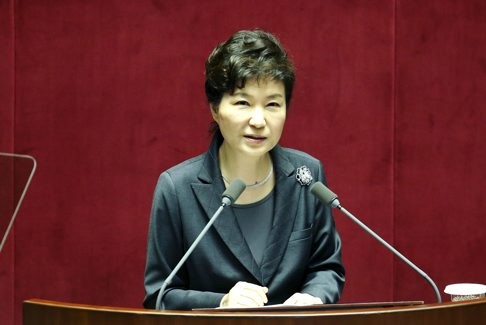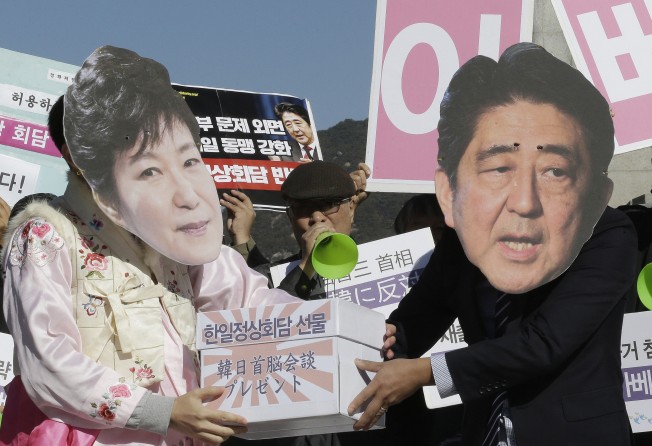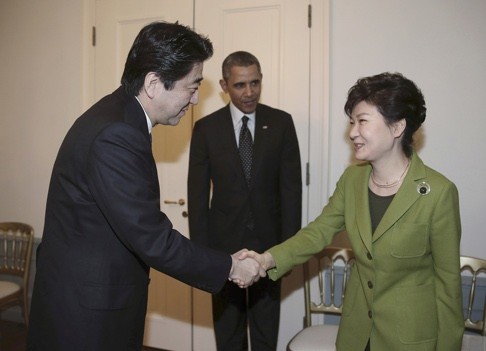
History hangs heavy as South Korea’s Park Geun-hye prepares for summit with Japanese PM Shinzo Abe
The South Korean leader has sparked controversy domestically with a plan to rewrite textbooks while Abe brings his own historical baggage

Historical interpretations have long bedeviled relations between South Korean President Park Geun-hye and Japanese Prime Minister Shinzo Abe. But with Abe about to arrive in Seoul on Sunday, Park’s latest historical intervention has generated a storm domestically, rather than internationally.
The furore began on October 12 when Park’s government announced that middle and high school history textbooks would, from 2017, be written by government authors. Current textbooks are produced by private publishers after being approved by an independent panel of experts.
“The correct way to raise our future generation is to instil in them pride in our country,” she said the following day.

The plan has sparked debate and protests by civic groups and opposition lawmakers. “A good president makes history,” said opposition leader Moon Jae-in. “A bad president makes history books.”
Many interpret the intervention by the conservative Park as an attempt to whitewash atrocities committed by right-wing forces and individuals during South Korea’s tumultuous recent history.
Information about massacres of leftists by Seoul forces before and during the 1950-53 Korean War was suppressed for decades. Only after left-wing governments won power in Seoul in 1998 and 2003 were those atrocities officially acknowledged.
A good president makes history. A bad president makes history books
Moreover, Park is the daughter of the late President Park Chung-hee, who seized power in a coup and masterminded South Korea’s “economic miracle,” but suppressed democracy and abused human rights for nearly two decades. In an editorial, the leftwing Hankyoreh newspaper dubbed Park “an eternal girl with a father complex”.
Experts say instilling a “single” or “proper” view of history is dictatorial.
“‘Proper history’ is a concept from dictatorial countries,” said Dr. Lee Jun-sik, a Research Fellow at the Centre for Historical Truth and Justice. “In a democratic society, there is no selected history.”
Adding that South Korea’s constitution guarantees freedom of education, Lee said: “Globally, the trend of education is toward diversity of opinion, but Korea is going backwards.”
The brouhaha is erupting just as Abe prepares to make the first visit of his current premiership to South Korea for a trilateral China-Japan-Korea summit on Sunday and Monday.

Abe has said he does not want young Japanese to be “predestined to apologise”, and his government has been censured in South Korea for toning down Tokyo’s wartime atrocities in its own textbooks.
Since taking office in 2013, Park has declined one-on-one meetings with Abe. She has advised him to learn “proper history” and repeatedly demanded apologies and compensation for “comfort women” – girls who served in frontline Japanese brothels during the second world war.
Given her vocal criticisms of Abe’s historical and allegedly nationalistic views, Park’s plans to rewrite Korean history, thereby instilling national pride, is raising eyebrows.
“She is saying Korean history is self-torturing, but in our history, too, there are some things to be sorry for, to reflect upon, and to be critical about,” said Lee. “This is an irony.”
“Park and Abe do not get along as their interpretations of history are entirely different,” added Korea Times columnist John Burton. “But Park is employing the same methods as Abe in trying to force-feed a uniform narrative – which smacks of hypocrisy.”
Abe – who, polls find, is more disliked in South Korea than North Korean leader Kim Jong-un – may face a heated reception in Seoul.
Days before his arrival, new statues of Chinese and Korean “comfort women” were erected in Seoul. One such monument already sits outside Seoul’s Japanese embassy, fermenting diplomatic discord between the capitals.